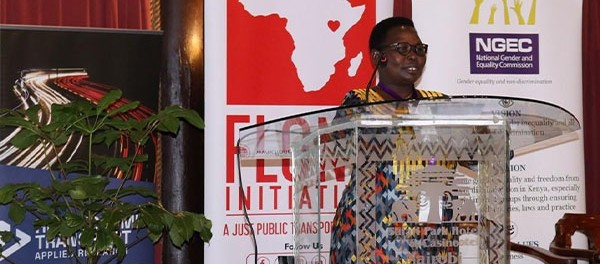Driving Change: Empowering Women in Transport to Shape GenderEqual Cities
Nairobi, December 6, 2024 — A spirited call for gender-responsive urban transport systems reverberated at the Safari Park Hotel this week as the Women and Transport Africa: Building Feminist Cities Conference concluded its 10th-anniversary celebration. The event, spearheaded by the Flone Initiative, brought together local and international stakeholders committed to shaping urban spaces that prioritize inclusivity and equity. Delivering the keynote address, Commissioner Caroline N. Lentupuru, MBS, HSC, of the National Gender and Equality Commission (NGEC), shed light on the systemic challenges plaguing urban transport systems. "Our cities are deeply gendered spaces," she remarked, critiquing how urban planning often neglects the distinct needs of women, persons with disabilities, and the elderly. Commissioner Lentupuru’s address underscored the reality that cities, though designed to appear neutral, often cater primarily to men’s perspectives. Women, especially rural migrants, face disproportionate challenges ranging from harassment in public transport to the inadequacy of safety infrastructure. "A rural woman’s perspective on urban safety can illuminate the broader gaps in our transport systems," she observed, urging stakeholders to consider such lived experiences in policymaking. The Commissioner’s remarks were supported by key findings from NGEC’s collaborative efforts with the Nairobi Metropolitan Area Transport Authority (NaMATA) and other stakeholders. These initiatives include gender-sensitive transport planning and anti-harassment campaigns, underscoring the pressing need for systemic reforms.
The conference's timing, during the global 16 Days of Activism against Gender-Based Violence, added urgency to the discussions. NGEC linked its advocacy efforts to this year’s campaign theme, "Towards Beijing +30: UNiTE to End Violence Against Women and Girls." Commissioner Lentupuru highlighted NGEC’s partnership with the Japan International Cooperation Agency (JICA) in piloting campaigns to combat gender-based violence in public transport. "By tackling GBV and building feminist cities, we are taking decisive steps toward achieving the Sustainable Development Goals," she affirmed.
As the conference concluded, a resounding consensus emerged: the path to equitable urban transport lies in creating cities that are safe, inclusive, and responsive to diverse experiences. "By empowering women in transport and prioritizing inclusivity, we can build a future where urban environments support sustainability, resilience, and equality for all," Commissioner Lentupuru said in her closing remarks. The Women and Transport Africa conference leaves Nairobi with a challenge and a promise—to reimagine urban transport systems that honour the dignity and safety of every passenger, transforming not just cities, but lives.
Among the proposed solutions were: Gender-responsive planning: Incorporating women’s perspectives in urban transport development. Infrastructure safety: Designing public spaces that prioritize safety and accessibility. Inclusivity in employment: Encouraging women to pursue careers in the transport sector and supporting female entrepreneurs in maledominated industries such as boda-boda and matatu operations.
NGEC Commissioner Caroline Lentupuru delivers insightful remarks at the Women and Transport Conference 2024, Safari Park Hotel, Nairobi


Comments